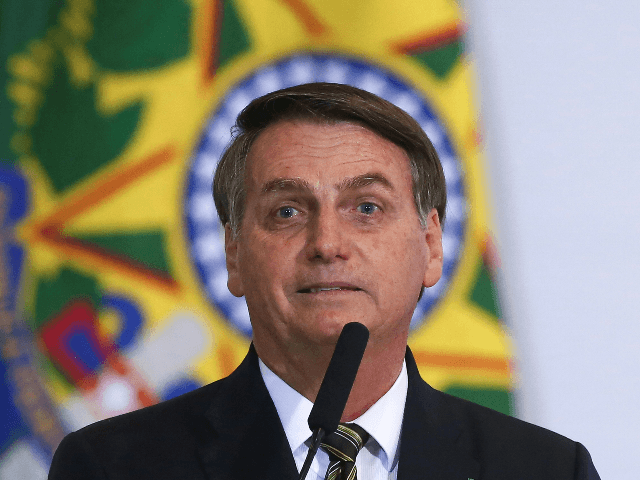President Jair Bolsonaro responded to President Donald Trump imposing tariffs on Brazilian steel and aluminum by stating that the two remain “friends,” but refuting Trump’s claim that Brazil was manipulating its currency at America’s expense, the Argentine outlet Infobae reported on Thursday.
President Trump announced tariffs on the two exports from Brazil and Argentina on Monday, accusing the two countries of implementing economic policies that hurt American farmers.
“We here don’t want to artificially inflate, we are not artificially inflating the price of the dollar,” Bolsonaro told reporters in Brasilia on Wednesday, according to Infobae. He insisted in those remarks that he was not disappointed with Trump because “the hammer hasn’t dropped yet … just because a friend spoke to me badly in some situation doesn’t mean I will turn my back on them.”
Bolsonaro insisted that the United States had taken no formal methods to impose the tariffs, so there was still time for both countries’ economic teams to convince Trump to rescind the policy, he announced via Twitter.
The conciliatory comments followed Bolsonaro insisting on Monday, when Trump announced the tariffs, that he had only done so because he faced reelection in 2020 and needed to galvanize voters, implying that Trump was lying about Brazil and Argentina manipulating their currencies.
“We know you have an election next year. This is part of your political strategy,” Bolsonaro said, addressing Trump, in an interview with the Brazilian newspaper Record, according to O Globo. “But we are a great partner. We believe that we can solve this issue. There are other things in play, too – The issue of American wheat, Mercosur moving towards the United States. So I don’t think that will shake us. A negotiation is possible.”
The Brazilian president said that the economic team was in contact with the Americans and talks were going well, but that he was willing to call President Trump personally if talks soured.
The head of Bolsonaro’s economic team, Economic Minister Paulo Guedes, repeated Bolsonaro’s accusation that Trump had falsely disparaged Brazil to win votes in the United States on Wednesday.
“There is no manipulation,” Guedes told reporters. “This is about political rhetoric, it has to do with the election. Trump is committing a brutal error thinking that we are provoking a competitive devaluation.”
By Thursday, Bolsonaro appeared to be positioning the Brazilian economy as a victim of Trump’s policies, not an aggressor against the American economy.
“I don’t know how many times their economy is bigger than ours. Many times,” Bolsonaro said. “My people are here with a slingshot and they are firing a .50 [caliber firearm].”
He repeated that, until Washington acts outside of Twitter, he would not take any measures to defend against American tariffs.
Despite the severity of the claim, O Globo, one of Brazil’s largest newspapers, reported following the tariff dispute that Bolsonaro’s government is still working to schedule a presidential visit from Trump within the next year – ideally, the newspaper claimed, before “the presidential campaign heats up in the United States.”
President Trump announced the tariffs on Twitter alleging that Brazil, under Bolsonaro, and Argentina, under outgoing conservative President Mauricio Macri, were deliberately devaluing their currency to make their agricultural products cheaper and thus undercut American farmers on the global market. The move would be particularly damaging to farmers growing crops tariffed amid the ongoing trade dispute between the United States and China.
“Brazil and Argentina have been presiding over a massive devaluation of their currencies, which is not good for our farmers. Therefore, effective immediately, I will restore the Tariffs on all Steel & Aluminum that is shipped into the U.S. from those countries,” Trump wrote on Twitter.
Brazil is a major economic competitor to the United States in growing soy crops, a key food item in the Chinese market. Brazil is China’s largest source of soy in the world and, despite Bolsonaro’s campaign promises that he would distance the country from communist China after nearly two decades of socialist rule, Bolsonaro embraced dictator Xi Jinping’s trade plans during a visit to Beijing in October.
“Brazil is a sea of opportunity for China,” Bolsonaro said during a meeting with Xi. “Brazil needs China, and China needs Brazil.”
China has enacted a global policy under its Belt and Road Initiative (BRI) – a global plan to build the world’s most advanced transportation infrastructure in partnering developing countries – of flooding Latin America, Africa, and Southeast Asia with billions in “aid” meant to strengthen China’s influence against America’s longtime presence there. In addition to negotiations with Brazil, Xi Jinping welcomed to Beijing this week President Nayib Bukele of El Salvador – similarly critical of ties to China as a presidential candidate as Bolsonaro, but coming home with a much larger aid package including promises for China to build a state-of-the-art stadium and redevelop a key tourism area known as “Surf City.”

COMMENTS
Please let us know if you're having issues with commenting.